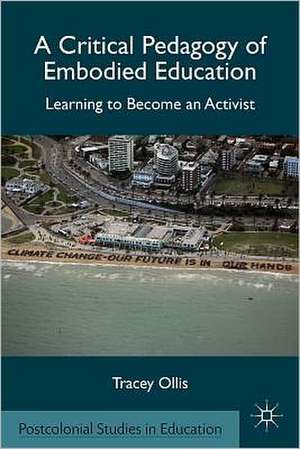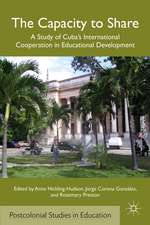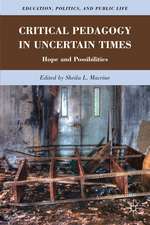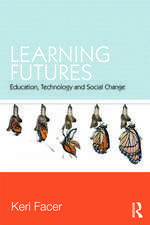A Critical Pedagogy of Embodied Education: Learning to Become an Activist: Postcolonial Studies in Education
Autor T. Ollisen Limba Engleză Hardback – 24 apr 2012
| Toate formatele și edițiile | Preț | Express |
|---|---|---|
| Paperback (1) | 298.42 lei 3-5 săpt. | |
| Palgrave Macmillan US – 24 apr 2012 | 298.42 lei 3-5 săpt. | |
| Hardback (1) | 305.70 lei 3-5 săpt. | |
| Palgrave Macmillan US – 24 apr 2012 | 305.70 lei 3-5 săpt. |
Din seria Postcolonial Studies in Education
-
 Preț: 306.57 lei
Preț: 306.57 lei -
 Preț: 299.96 lei
Preț: 299.96 lei -
 Preț: 324.21 lei
Preț: 324.21 lei - 9%
 Preț: 756.91 lei
Preț: 756.91 lei - 8%
 Preț: 543.15 lei
Preț: 543.15 lei -
 Preț: 305.50 lei
Preț: 305.50 lei -
 Preț: 304.38 lei
Preț: 304.38 lei - 8%
 Preț: 582.60 lei
Preț: 582.60 lei -
 Preț: 305.50 lei
Preț: 305.50 lei -
 Preț: 301.10 lei
Preț: 301.10 lei -
 Preț: 307.68 lei
Preț: 307.68 lei -
 Preț: 387.75 lei
Preț: 387.75 lei - 18%
 Preț: 725.61 lei
Preț: 725.61 lei -
 Preț: 397.38 lei
Preț: 397.38 lei -
 Preț: 386.81 lei
Preț: 386.81 lei - 18%
 Preț: 888.31 lei
Preț: 888.31 lei - 18%
 Preț: 894.03 lei
Preț: 894.03 lei
Preț: 305.70 lei
Nou
Puncte Express: 459
Preț estimativ în valută:
58.50€ • 60.85$ • 48.30£
58.50€ • 60.85$ • 48.30£
Carte disponibilă
Livrare economică 24 martie-07 aprilie
Preluare comenzi: 021 569.72.76
Specificații
ISBN-13: 9780230340510
ISBN-10: 0230340512
Pagini: 242
Ilustrații: XIX, 242 p.
Dimensiuni: 140 x 216 x 20 mm
Greutate: 0.46 kg
Ediția:2012
Editura: Palgrave Macmillan US
Colecția Palgrave Macmillan
Seria Postcolonial Studies in Education
Locul publicării:New York, United States
ISBN-10: 0230340512
Pagini: 242
Ilustrații: XIX, 242 p.
Dimensiuni: 140 x 216 x 20 mm
Greutate: 0.46 kg
Ediția:2012
Editura: Palgrave Macmillan US
Colecția Palgrave Macmillan
Seria Postcolonial Studies in Education
Locul publicării:New York, United States
Cuprins
A Critical Pedagogy of Activism Introduction Defining Activism The 'Accidental Activist' Prelude to the Research Activist as Researcher The Importance of a Book on Activists' Pedagogy Central Research Questions Book Structure Case Study Research Introduction Qualitative Research Phenomenology Research as Social Change Why are you doing 'Objectivist' Research? The Method Conclusion The Politics of Adult Education Introduction Popular Education and Radical Adult Education Learning through Social Action Learning to Think Critically Transformative Learning Learning to be Radical Social Learning Learning on the Job Identity and Learning Postcolonial Theories of Education Conclusion The Lifelong Activists Introduction The Lifelong Activists – Biographical Profiles Typologies and their Limitations Stages and Phases of Learning Student Politics Developing an Activist Epistemology Learning Skills 'on the job' of Activism Significant Mentors Identity: Learning to become an Activist Emotions and Learning Spirituality Conclusion Case Study: Jorge's Story Conclusion Case Study: Cam Walker's Story Conclusion Case study: Kerry's Story Conclusion Conclusion to the Quintain of Case Studies The Circumstantial Activists Introduction Circumstantial Activists: Biographical Profiles Stages and Phases of Learning Circumstances and Activism Formal Learning Developing an Activist Epistemology Critical Thinking Identity Formation – Learning to become an Activist Emotions and Learning The Learning Edge Religion, Social Justice and Spirituality Conclusion Case Studies Introduction Case Study: Terry's story Conclusion Case Study: Catherine's story Conclusion Case Study: Tim Forcey's story Conclusion Case study: Grace's story Conclusion Embodied Learning Introduction Learning and the Whole Body: Being There Rationalism and Adult Education The Junk Category of Practical Knowledge Emotions and Activism Critical Thinking in Intelligent Bodies Conclusion Informal and Social Learning IntroductionSocial Learning: Communities of Practice Apprenticeship Learning: The Role of Mentors Learning Community Rapid Learning and Circumstantial Activists Power and the Social Learning Model Learning to 'become' an Activist Conclusion A Critical Pedagogy of Embodied Education Introduction The Typology of Lifelong and Circumstantial Activists Activists' Stages and Phases of Learning (both groups) Differences between Lifelong and Circumstantial Activists Facilitating a Critical Pedagogy of Activism a way Forward The Intelligent Body Freire's Legacy A Final Word
Recenzii
'Tracey Ollis has written an important and insightful book. A Critical Pedagogy of Embodied Education provides us with a nuanced and very thoughtful discussion of how people become activists, a critical issue during a period when social and educational activism is ever more necessary.' - Michael W. Apple, John Bascom Professor of Curriculum and Instruction and Educational Policy Studies, University of Wisconsin, Madison
'In A Critical Pedagogy of Embodied Education Tracey Ollis does a brilliant job theorizing about similarities and differences in two types of adult activists-lifelong and circumstantial. Using case study methodology, the author powerfully chronicles the subjects' embodied pedagogy of activism despite their different life trajectories and reasons for engaging in activism. This book makes a significant contribution to the fields of adult education, critical pedagogy, and community organizing, and it offers a highly original understanding of the nature of activism and the reality that all successful learning - for students in general and for activists in particular - goes beyond mere issues of cognition and must encompass students' sense of justice, and their strong emotional and spiritual connections as well! A Critical Pedagogy of Embodied Education is not only illuminating but it reminds us that life-long learning is part and parcel of any aspiration for a democratic life.' - Lilia I. Bartolome, Professor of Applied Linguistics, College of LiberalArts, University of Massachusetts Boston
'Activism is, thankfully, alive. 'Occupy' is the cry everywhere at present. In this book, Tracey Ollis shows how activists learn from what they do. Activism is an informal, emotionally-charged form of practice, where reflecting-in-action (to use Donald Schön's famous term) is itself educational. Ollis shows with case studies and conceptual innovation how popular protests and timely readings of opportunism can come together in really successful adult learning for activists of all kinds. For those who want to understand resistance better, read here how circumstances can drive the social and political changes you value and, more inspirationally, how you can create those circumstances through what you do through your embodied learning from, and amidst, activism.' - David Beckett, Associate Professor, Melbourne Graduate School of Education
'In A Critical Pedagogy of Embodied Education Tracey Ollis does a brilliant job theorizing about similarities and differences in two types of adult activists-lifelong and circumstantial. Using case study methodology, the author powerfully chronicles the subjects' embodied pedagogy of activism despite their different life trajectories and reasons for engaging in activism. This book makes a significant contribution to the fields of adult education, critical pedagogy, and community organizing, and it offers a highly original understanding of the nature of activism and the reality that all successful learning - for students in general and for activists in particular - goes beyond mere issues of cognition and must encompass students' sense of justice, and their strong emotional and spiritual connections as well! A Critical Pedagogy of Embodied Education is not only illuminating but it reminds us that life-long learning is part and parcel of any aspiration for a democratic life.' - Lilia I. Bartolome, Professor of Applied Linguistics, College of LiberalArts, University of Massachusetts Boston
'Activism is, thankfully, alive. 'Occupy' is the cry everywhere at present. In this book, Tracey Ollis shows how activists learn from what they do. Activism is an informal, emotionally-charged form of practice, where reflecting-in-action (to use Donald Schön's famous term) is itself educational. Ollis shows with case studies and conceptual innovation how popular protests and timely readings of opportunism can come together in really successful adult learning for activists of all kinds. For those who want to understand resistance better, read here how circumstances can drive the social and political changes you value and, more inspirationally, how you can create those circumstances through what you do through your embodied learning from, and amidst, activism.' - David Beckett, Associate Professor, Melbourne Graduate School of Education
Notă biografică
TRACEY OLLIS is a Lecturer in Applied Human Rights, in the School of Education at RMIT University, Australia.















